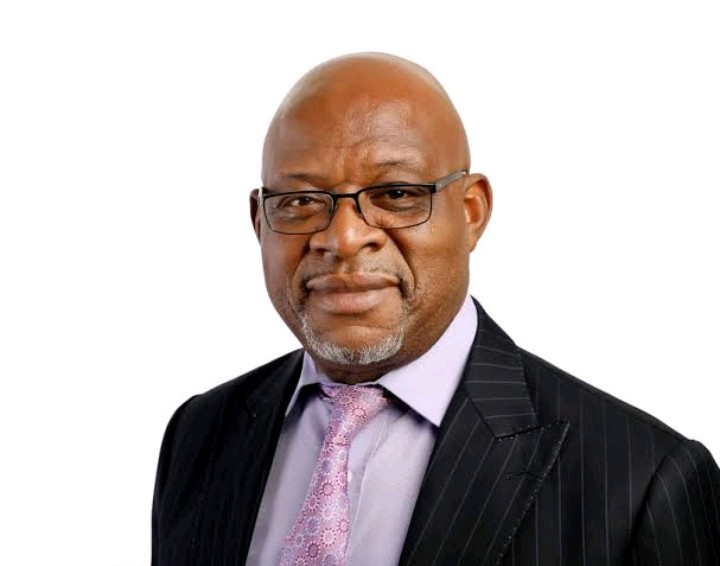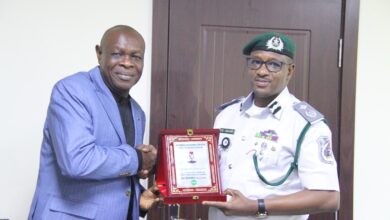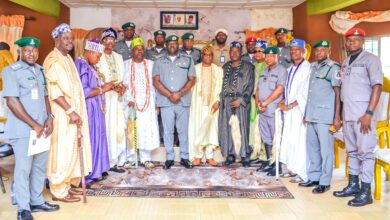There’s Dearth of Competent Staff at NIMASA, Say’s Former DG, Omatseye
... "Agency Becoming Dumping Ground for Politicians' Children"

Former Director General of the Nigerian Maritime Administration and Safety Agency (NIMASA) Temisan Omataseye has raised an alarm over the agency’s failure in professionalising its workforce and adhering to international standards of maritime administration.
The former DG stated that NIMASA has become a dumping ground for unqualified individuals, including political appointees’ children, lacking the competence to manage the nation’s critical maritime assets.
He disclosed in his presentation at the maiden edition of “The Code Blue” Virtual Meeting held on 30th July,2025
According to Omatseye , the agency has not evolved structurally since its inception, despite the availability of an organogram designed to mirror global best practices in maritime governance. Rather than function as a specialised regulatory institution, NIMASA has allowed its human capital to stagnate without a clear career development path or technical training aligned with the operational and administrative demands of maritime oversight.
Omatseye who is a martime lawyer and shipowner, warned that the absence of qualified personnel within the agency poses a significant risk to national safety, especially given Nigeria’s extensive coastline and maritime traffic.
“The challenges facing the Nigerian Maritime Administration and Safety Agency (NIMASA) are not necessarily due to the volume of responsibilities it handles, but rather the failure to professionalise its workforce. NIMASA lacks the structural foundation typical of a maritime administration. While an organogram was developed at its inception to guide its operations, it has never been properly implemented. Ideally, a maritime administration should have a clearly defined structure that reflects global best practices, where every employee enters with a clear career path and receives targeted training aligned with the agency’s strategic mandate. Unfortunately, this vision remains unrealised.
“Instead of functioning as a professional and technical institution, NIMASA appears to have become a dumping ground for political appointees and relatives of influential individuals. Recruitment often lacks the rigor required for such a critical agency, and many staff members are not adequately trained or equipped for the specialised roles they occupy. While tests may be conducted during recruitment, they do not translate into the kind of technical and regulatory capacity needed to drive maritime safety, compliance, and international standards. As a result, the agency operates with significant gaps in knowledge, efficiency, and execution.
“Nigeria has been fortunate not to have experienced a major maritime disaster in recent years an event that would have truly tested the country’s capacity to respond and would have exposed the deep flaws in the system. The sad reality is that both the manpower and management of NIMASA are, at present, not fit for purpose. Without urgent reforms focused on institutional structure, career development, and professional training, NIMASA will continue to fall short of its critical national and international obligations.”, he said.
On the newly launched 10 year National Policy on Marine and Blue Economy, while acknowledging the potential of the policy to reposition Nigeria as a maritime power, he expressed concern that without a robust implementation strategy and measurable key performance indicators (KPIs), the document is likely to join the long list of policies that have failed due to poor execution.
He noted that despite major developments in Nigeria’s maritime and energy sectors such as the Dangote Refinery, growing fertilizer exports, and the African Continental Free Trade Agreement the local maritime industry remains disconnected from the supply chain as many of the petroleum and dry cargo exports are being transported on foreign flagged vessels, including those from Angola, due to a lack of capacity and coordination among Nigerian shipowners and maritime regulators.
Furthermore, he highlighted missed opportunities in marine infrastructure development, especially as new private refineries and ports are being built with little or no input from local maritime stakeholders. He pointed to Dangote’s extensive export plans and questioned why Nigerian shipping interests are not being factored into the logistics and shipping components of such large scale operations.
The shipowner, also said that the neglect of human capital development programs like the Nigerian Seafarers Development Programme (NSDP), which trains young Nigerians in maritime skills remains unable to obtain Certificates of Competency, effectively rendering their education useless in both local and global maritime labor markets.
On the issue of ship recycling and wreck removal , he stressed that Nigeria is sitting on vast wealth rusting at the bottom of its waters. He noted that while other countries like Bangladesh and India have capitalised on the ship breaking industry, gaining not only revenue but also international influence. Nigeria, by contrast, has failed to invest in or regulate this sector effectively, despite ongoing illicit activities by foreign operators, particularly Chinese companies.
He disclosed personal experiences with unauthorised dismantling of vessels under arrest, suggesting widespread impunity and lack of oversight in the sector.He said , ships are illegally scrapped and melted down in remote yards without any regulatory intervention or environmental compliance.
Omatseye also lamented the lack of coordinated tourism and leisure maritime initiatives such as cruise liners that could travel the West African coast, or sports fishing enterprises that could boost both tourism and coastal economies. Instead, he said that foreigers now dominate Nigeria’s fisheries, exporting local marine life only to sell it back to Nigerians at premium prices.
He warned that unless the government shifts from mere policy drafting to strategic execution backed by well trained personnel, accountable leadership, and stakeholder collaboration , the Blue Economy would remain a rhetorical ambition.
Founder of The Blue Economy Academy, Ubong Essien in his address said that the initiative titled “Code Blue”, is aimed at addressing the widespread lack of awareness around Nigeria’s maritime potential, and its step toward repositioning the country’s relationship with its ocean and coastal resources, as the Academy seeks to awaken national consciousness about the vital role of the seas in economic development.
Code Blue, he said will be a monthly platform designed to raise awareness, stimulate strategic conversations, and promote actionable engagement in Nigeria’s Blue Economy sector as the initiative is structured to serve as a pulse checker , bell weather for the maritime sector, and a space for ongoing collaboration among stakeholders.
He said the academy was founded as a response to what they identified as sea blindness despite having a coastline that stretches over 850 kilometers and significant maritime potential, much of Nigeria’s population, including policymakers, remains detached from the realities and opportunities presented by the sea.
Essien said that the academy positions itself as a neutral knowledge hub, distinct from maritime regulatory agencies or traditional academic institutions and itprimary goal is to bridge the gap between maritime experts and the general public by mainstreaming education and awareness about the Blue Economy. Through public discourse, strategic training, and community engagement.
Drawing on three years of firsthand experience in the maritime sector, including serving as a strategic adviser to the former Director-General of NIMASA, the Academy’s founder said academy’s programming reflects this background, emphasising non academic, industry oriented learning that focuses on practical application rather than theoretical instruction.
He also said that the academy encourages participation in various blue economy ventures, ranging from fisheries and environmental protection to marine logistics and coastal enterprise development and one of the initiative’s central messages is the urgent need to shift national focus away from finite resources like oil and toward renewable, water based assets.
The Academy also called for inclusive growth through its 10 thematic focus areas, known as “inclusion buckets.” which includes Blue Commerce, Blue Capital, Blue Talent, Blue Governance, and others that encompass the diverse opportunities within the ocean economy. Each of these areas will be explored through upcoming Code Blue sessions, which will feature insights from industry leaders and emerging innovators.
In the same vein, the Director General of the Nigerian Chamber of Shipping , Vivian Chimezie Azubuike described Nigeria’s ambitious 10 Year Marine and Blue Economy Policy as a solid foundational framework, with its success depending on tangible implementation, institutional coordination, and private sector alignment.
Vivian Azubuike in her paper presentation titled “ Blue to Reality Mainstreaming Nigeria’s 10 Year Marine & Blue Economy Policy for
Action “ emphasised that while the policy rightly touches on areas such as maritime transport, fisheries, tourism, offshore energy, marine biotechnology, and environmental resilience, Nigeria has not optimised its position or harnessed its blue economy resources effectively.
One of the key challenges identified was the disjointed state of policy execution, regulatory overlap, and weak institutional frameworks. Despite having multiple directorates under the new Ministry of Marine and Blue Economy, there remains a lack of coordination among key players, leading to duplication of efforts and resource wastage.
She questioned the ongoing proliferation of new ports while existing ones remain underutilised and poorly maintained and argued for a more strategic investment in navigable inland waterways and hydrographic mapping, rather than politically motivated port expansion projects that offer little economic return.
She said that with Nigeria’s extensive coastline and numerous coastal communities, the potential for eco-tourism and artisanal fishing remains largely ignored, especially when compared to regional counterparts such as Ghana, where community driven marine conservation and tourism are already thriving.
On the persistent mismatch between education and industry needs, she pointed out that Nigeria continues to graduate large numbers of maritime students and seafarers, yet their qualifications are not globally accepted, leading to limited international placements. This, along with an inefficient ship registry and poor flag state performance, diminishes Nigeria’s maritime credibility.
In her presentation, she stressed that the Nigerian private sector, particularly in shipping, faces structural obstacles such as limited access to financing, underutilized maritime development funds, and weak linkages to emerging opportunities, such as those presented by industrial giants like Dangote.
Azubuike proposed the creation of a National Blue Economy Implementation Council, comprising representatives from key government agencies, industry groups, academia, and development partners. This body she said will would oversee strategy execution, regulatory harmonization, capacity development, and performance monitoring.
While she acknowledged recent political will from both the federal executive and ministerial leadership, she noted that progress must be backed by enforceable legislation, transparent funding mechanisms, and a performance driven mindset. She highlighted International funding opportunities from organizations such as the IMO, UNDP, and EU Blue Growth Fund as viable options provided Nigeria demonstrates readiness with credible blueprints and governance frameworks.
Speaking further , the maritime expert recommended piloting port digitisation, designating marine tourism and blue energy development zones, establishing marine innovation hubs, and enforcing marine zoning within Nigeria’s Exclusive Economic Zone (EEZ). These steps, she argued, are essential for building a sustainable, competitive, and inclusive blue economy.
Maritime expert, Olaitan Willams , also called for a fundamental shift in Nigeria’s approach to developing its marine and blue economy. She urged stakeholders to move beyond policy rhetoric and begin implementing grassroots driven, sustainable initiatives that prioritise education, local capacity building, and job creation.
She noted that over 75% of individuals in Nigeria’s maritime sector found their way into the industry by accident, a result of the absence of structured maritime education and career guidance from an early age. According to her, introducing maritime education at the primary school level is critical for longterm sustainability. Without early awareness, particularly in coastal communities such as Port Harcourt and Kirikiri, the country risks losing the next generation to ignorance, economic exclusion, and neocolonial domination.
Williams highlighted the large population of unemployed youth in Nigeria’s coastal regions many of whom possess valuable but untapped skills like swimming and diving. She warned that without targeted vocational training and development, these communities would continue to be neglected and vulnerable to criminal activities, including piracy. She emphasised that piracy often starts with idle youths in these areas, eventually escalating into organized maritime crimes.
To address this, she proposed a three pronged strategy, to introduce maritime education at an early age, establish vocational training in coastal communities, and ensure that revenue generated from the maritime sector is reinvested back into the industry. Williams also addressed Nigeria’s overdependence on foreign vessels and shipbuilding. She suggested a local ship assembly model, similar to the Mikano generator approach, where imported parts are used for domestic assembly. She insisted that Nigerian master mariners have the expertise to assemble ships locally, thereby creating jobs and building national capacity.
She further called for improved utilization of the Cabotage Vessel Financing Fund (CVFF) to support this ship assembly model and develop local shipyards tailored to Nigeria’s commercial and logistics needs. In addition, she proposed establishing a Sustainability Office within the newly formed Ministry of Marine and Blue Economy to ensure longterm policy continuity and reduce dependence on shifting political agendas.
While acknowledging the efforts of the Minister of Marine and Blue Economy, Adeboyega Oyetola, she cautioned against delays in implementation. She stressed that meaningful action should begin within two years, not stretch across political terms.












One Comment